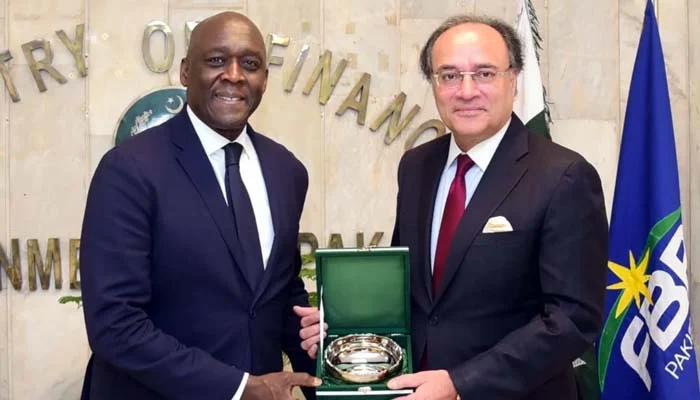The Chief of the International Finance Corporation (IFC) stated that a $2 billion annual investment is “not a large number” for Pakistan, given its pressing infrastructure needs in airports, energy, water, and ports.
Makhtar Diop, IFC’s Managing Director & Executive Vice President, made his maiden visit to Pakistan following the World Bank’s announcement to allocate up to $20 billion for Pakistan under the Country Partnership Framework (CPF) in January. The IFC is also expected to invest the same amount.
Preparing for Large-Scale Investments
Diop stated, “Between now and maybe October, we will be able to progress enough on a couple of transactions that will signal that this is a country ready to receive large-scale financing for critical and important infrastructure.”
Pakistan, which recently averted a sovereign debt default, is currently under a $7 billion IMF bailout program and struggling to recover economically. With foreign exchange reserves insufficient to cover even a month’s worth of controlled imports, the country desperately needs external funding for development projects.
IFC’s Investment Plans for Pakistan
During FY2024, IFC had an exposure of $2.1 billion in Pakistan, marking a record investment in the country’s $350 billion economy, which saw a mere 0.92% growth in the first quarter of the fiscal year.
Diop emphasized that IFC is exploring investment opportunities in agriculture, infrastructure, financial services, and the digital economy. He highlighted that equity-based transactions would play a greater role, reflecting IFC’s confidence in Pakistan’s long-term economic potential.
Government’s Privatization Efforts
The government is pushing for privatization to generate revenue, but efforts to privatize Pakistan International Airlines (PIA) and outsource Islamabad Airport have not been successful.
Following IFC’s global investment trend, Diop said, “Debt will still be an important part of our business, but our equity investment will increase globally, including in Pakistan. This shows our belief in Pakistan’s economic potential.”
Meetings with Government Officials
During his visit, the IFC delegation met with Finance Minister Muhammad Aurangzeb and other officials to discuss policies for industry-driven growth, particularly export-led expansion.
Diop reaffirmed IFC’s commitment to supporting Pakistan in key areas such as green energy, data centers, agricultural supply chains, telecommunications, and digitalization.
Speaking about Pakistan’s partnership with the World Bank, Diop praised the Country Partnership Framework (CPF) as a global best practice.
Long-Term Partnership with the World Bank
Dr. Syed Tauqeer Hussain Shah, Executive Director for Pakistan at the World Bank Group, highlighted that the recently approved $40 billion CPF for the next decade is a strong endorsement of Pakistan’s reform agenda.
Last month, the World Bank stated that structural reforms to boost private sector growth and increase fiscal space for public investment in critical sectors are essential.
Since 1950, the World Bank has provided Pakistan with over $60 billion in financing. However, the new CPF represents a longer-term approach compared to previous agreements, which typically lasted four to six years.



